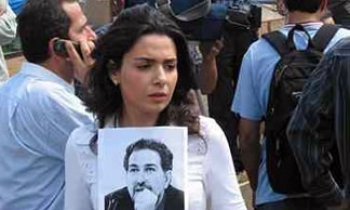NEW DELHI, August 29: There are different ways in that different people ask journalists to behave themselves. The last fortnight saw a surfeit of that.

The first was a salvo from Andhra Pradesh Chief Minister YS Rajasekhara Reddy. Since the recalcitrant Maoists stopped smoking the peace pipe with him, Reddy has been one beleaguered man. And having come a cropper to make the agrarian Naxalite leadership stick to the negotiating table, Reddy let loose his ire on the press. Journalists, he revealed, were not above the law. True, when did journalists say they are?
Having said that, the Chief Minister asserted that interviewing Maoist guerrillas was a crime. Well said, Mr Chief Minister. All these days that you were trying to talk to the militants in your bid to usher peace to the troubled areas of your state, we guess you were committing no crime. In the state of Andhra Pradesh there is only one version of the truth that of Reddy's. All others are either criminals, or abettors of crime.
Well, well. The Chief Minister's fretfulness can be understood. The Naxals had warned Congress MLA Narsi Reddy and his family, through an interview in the media, that unless they put an end to their hand in the arrack business in Mahbubnagar district, they would be eliminated. A week later the legislator and his son were shot dead. The Congress government had failed to protect Narsi Reddy in spite of being forewarned. And all that the man at the helm of affairs did subsequently was to start gunning for journalists. Poor man, what else could he do?
The Andhra Pradesh Chief Minister was hauled over the coals, albeit indirectly, when his Prime Minister Manmohan Singh declared, ironically, in Reddy's own state capital, that any political group can use the media to air its views. Stressing that a "free press is the ultimate check" against the "tyranny" of authority, the Prime Minister said the media is "like a mirror" that enables those in power to get a reality check continuously.

The soft-spoken Prime Minister's words seemed to have seeped in through the Chief Minister's closed mind somehow. He did his reality check, and a day later, a sobered-down Reddy spoke in a toned down tenor about objectivity. He called upon journalists to write about issues in a dispassionate manner, rising above denominational considerations and always keeping in mind, betterment of the society. Reddy seemed to have realised that threatening journalists is a counter-productive way of finding yourself in the media limelight.
So what did he do now? He talked about the negative publicity dished out to former Prime Minister PV Narasimha Rao. Then he went on to exhort journalists to write about the environment. "We tinkered too much with environment. We have overexploited groundwater and felled trees so much that whenever I go by helicopter, I cannot see a single large tree in a forest. It speaks of man's selfishness." Profound statements, those. Perhaps he himself could start with enlisting the flagrant violations of the Coastal Zone Regulation Act that have been perpetrated along his own state's coastline. He may soon change his mind on this count too. The grass is always green on this side of the fence.
Reverting back to what the Prime Minister said at the silver jubilee celebrations of the Telugu daily Prajashakti; actually apart from over-riding Reddy's remarks whatever he said was what is usually said at such seminars about "the nation and the press". Point to be noted: "At this historical juncture, when we seek to create a modern, progressive, inclusive and dynamic society, built on a rapidly growing economy, I venture to think that it is a good time to be in your profession (addressing journalists)." Quite right. The media, as a business, never had it better. The media, as a profession?
The answer to that came from the Minister for Information and Broadcasting, Jaipal Reddy. It was time to go back to serious journalism, he told the same gathering. The reason? The minister identified trivialisation, glamorisation and sensationalism as three shocks suffered by the Indian media. Media critics, like this writer, would have agreed wholeheartedly with him.
But not if they heard what Reddy had to say next. In the midst of this negative trend, he said, were newspapers like Prajashakti that were discharging their social responsibilities and practising alternative, serious and parallel journalism, and were committed to true code of ethics. Like Prajashakti or dislike it, but citing the mouthpiece of a political party (the CPI-M, for the uninformed) as the epitome of serious and parallel journalism can hardly find takers among the most committed and untainted of journalists.

The onus of tainting journalists was left with Uttar Pradesh Chief Minister Mulayam Singh Yadav. He had a good reason to do that he was extremely chagrined with the land scam of his government being "exposed" by a news channel and a newspaper. The wrestler-turned-politician hit back at journalists in his inimical style. And how did he do that?
Of course, he accused journalists of accepting freebies from his regime mostly in the form of allotment of houses. This he did at a press conference. Understandably so. After all you need one half of the media to defile the other half (these days you can never be sure which half is pure). Presumably all those who attended this press meet were those who had not accepted any favours from Yadav. Not even a free lunch, eh? Now, now. That would be difficult to digest.
If one was to stay away from this mudslinging bout, one would have to travel back in time once again this time to the interregnum between Rajasekhara Reddy's outburst and subsequent sobering down. To happennings pertaining to two of the highest offices in the country that of the Speaker of the Lok Sabha and the Supreme Court. The first was a veiled threat; it is premature to make anything of the second.
Speaker Somnath Chatterjee ruled that English daily The Pioneer had perpetrated a breach of privilege by publishing a "grossly libellous" article but rejected a privilege motion saying it would be beneath the dignity of the House to take further note of motivated imputations. But unfortunately, Chatterjee's observations came with an appended warning, "In future, reckless and contumacious conduct indulged in, by whosoever may be, will be dealt with in the appropriate manner, so as to preserve and enhance the dignity of the highest public forum in our country."

Now, this was uncalled for. The Speaker's reaction was too general in that it was directed at the press in general. The allegation that the Speaker was not rising above party level politics had been levelled by columnist Swapan Dasgupta. As all now know, Dasgupta is a journalist-turned-BJP ideologue. And the paper through which Dasgupta chose to make digs at the Speaker is edited by Chandan Mitra, whose BJP bent of mind is alleged as much.
The entire episode was not a press versus parliamentarians debate, but arguably one of shadowboxing through a newspaper's columns. One may nor may not agree that Dasgupta went too far with poking fun at one of the most august offices in the country, but even the Speaker ought to have taken Dasgupta's political antecedents into account.
The ones whose motives, on the other hand, were questioned were the Times of India and Hindustan Times the same day. The Supreme Court issued notices on a public interest litigation (PIL) questioning the publication of "titillating material" in the name of right to freedom of speech and expression enjoyed by the press. Notices were issued to the Union Government, the press Council of India, the Times of India, Hindustan Times, the press Trust of India (PTI) and the United News of India (UNI).

How much less clothing is too much to stop men from salivating over the newspapers may be debatable. Not a fine line there. But there would be one in the proposed amendments to the Information Technology Act that have been reported. With an amended IT Act, peeping tom journalism or entrapment journalist (whatever you call it) may soon see a fade-out. The proposed amendments have their share of ambiguities (one might call them equivocalness, too), and invasion of privacy would now be illegal.
The flipside to it all is that now you can no more catch on an electronic device anyone redhanded committing an illegal/immoral act. Just read this line that may be inserted into the IT Act: "Whoever intentionally captures or broadcasts an image of an individual without his consent, and knowingly does so under circumstances violating the privacy of that individual, shall be held liable."
Hmm, that nips sting TV in the gross act itself. So, the next time a journalist wants to expose anyone with a still or rolling camera, sh/e would have to think many times over. Perhaps, even seek legal counsel first. The damage wrought to journalistic credibility and ethics by the kinds of India TV and Mid-Day will have to be borne by the journalists of morrow.









